✨ Introduction – Why “The Talking Cave Story in English” Still Matters Today
Truth protects those who respect it, and intelligence guides those who choose wisdom over pride. Across centuries, countless stories have warned us about the dangers of blind trust and the strength of thoughtful caution. Among them, The Talking Cave Story in English continues to shine like a guiding lamp—reminding children and adults alike that quick comprehension and presence of mind can save one from situations where physical strength fails.
Rooted deep within the Panchatantra Story in English, this tale is also lovingly remembered as The Lion and the Jackal Story in English, where the mightiest creature of the forest is humbled not by another beast, but by the cleverness of a small, cautious jackal. In this The Talking Cave Moral Story, strength stands face–to–face with intelligence, and only one survives.
Through forests rich with ancient wisdom, wandering animals discovered every day that instinct alone was not enough. The lion, powerful and unmatched, believed the world bowed before him. But the jackal understood a deeper truth: survival is given not to the strongest, but to the one who thinks before acting.
The enduring charm of The Talking Cave Story in English lies in its simple lesson. Whether in the jungle or modern life, danger often wears a quiet face. Trusting blindly can lead to ruin, but questioning with patience can reveal hidden traps. Parents today still narrate this story because it teaches their children that being clever is not trickery—it is the ability to recognize danger and act wisely.
So let us step into the dense Indian forest where shadows play under golden sunlight, where leaves whisper secrets, and where a hungry lion believes power will save him. Meanwhile, a small jackal listens closely, chooses caution, and proves that wisdom always outshines strength.
The voice of the cave still echoes through time, calling out to all:
“Beware… not everything that speaks is truth.”
This is The Talking Cave Story in English—a journey of danger, awareness, and triumph of intelligence over brute force.
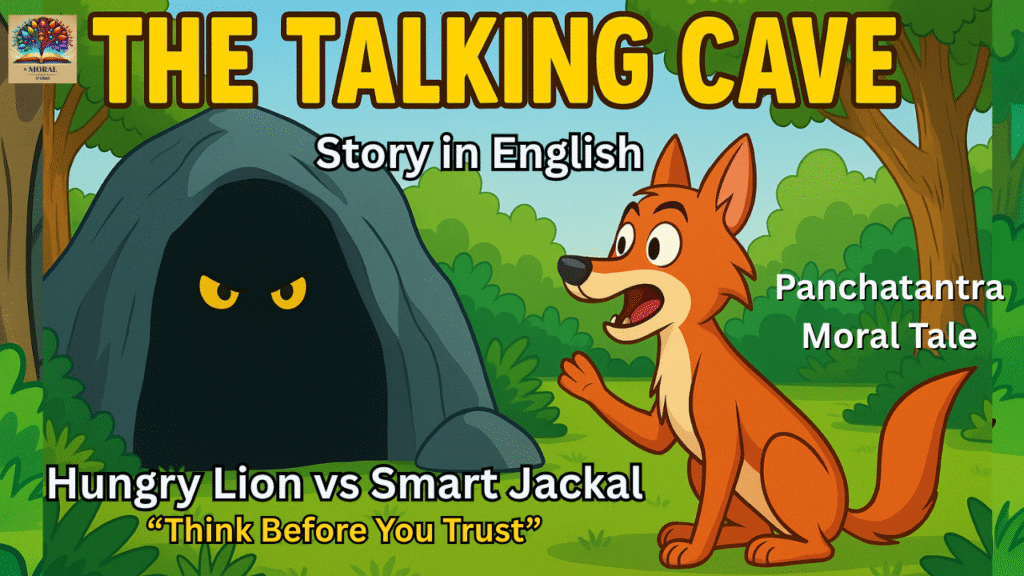
🌳 Scene 1 – The Hungry King of the Jungle
(The Talking Cave Story in English)
The jungle was breathing with life as the warm afternoon sun filtered through towering sal trees, showering the forest floor with a mosaic of gold and green. Birds flitted from branch to branch, squirrels chased each other playfully, and deer remained alert, knowing that the forest was a place of beauty—but also of danger.
Amidst this thriving wilderness strode a lion, the undisputed king of the jungle. His mane, once shining like polished bronze, now hung loosely, dusty and dull. He walked with slow, heavy steps, every movement revealing the exhaustion weighing on his body. For days, prey had eluded him. The streams offered no relief, the small animals hid deep within the thickets, and the larger ones kept to safer grounds.
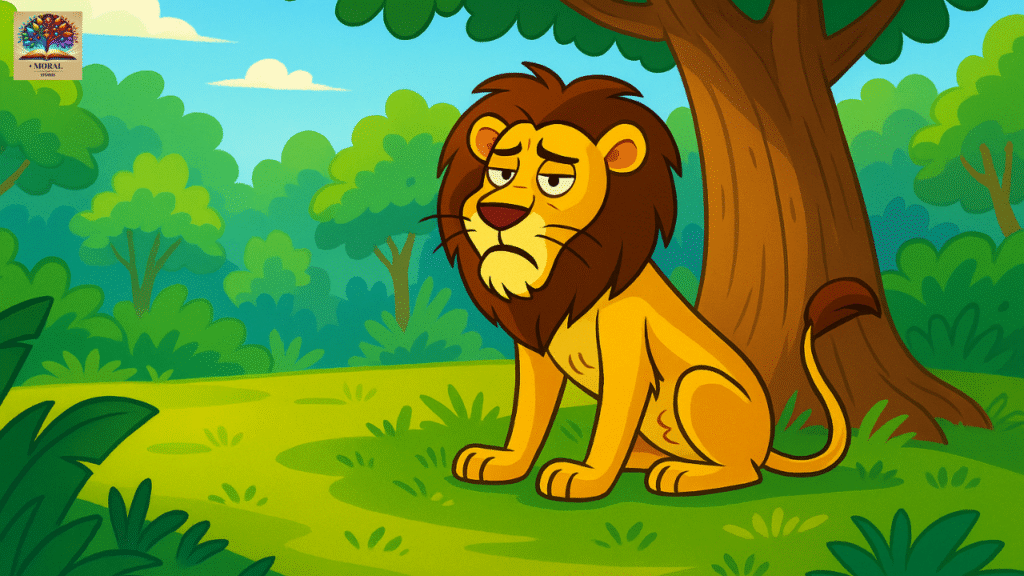
This lion, feared by all who roamed the forest, now felt hunger twisting inside him like a snake. His mouth felt dry, his steps turned unsteady, and his eyes scanned the surroundings with desperation rather than dominance. Strength was slipping away—not because his muscles weakened, but because nature had withheld its blessings.
“I am king,” he growled softly to himself, though there was no one to hear. “Yet today, even the smallest creature escapes me.”
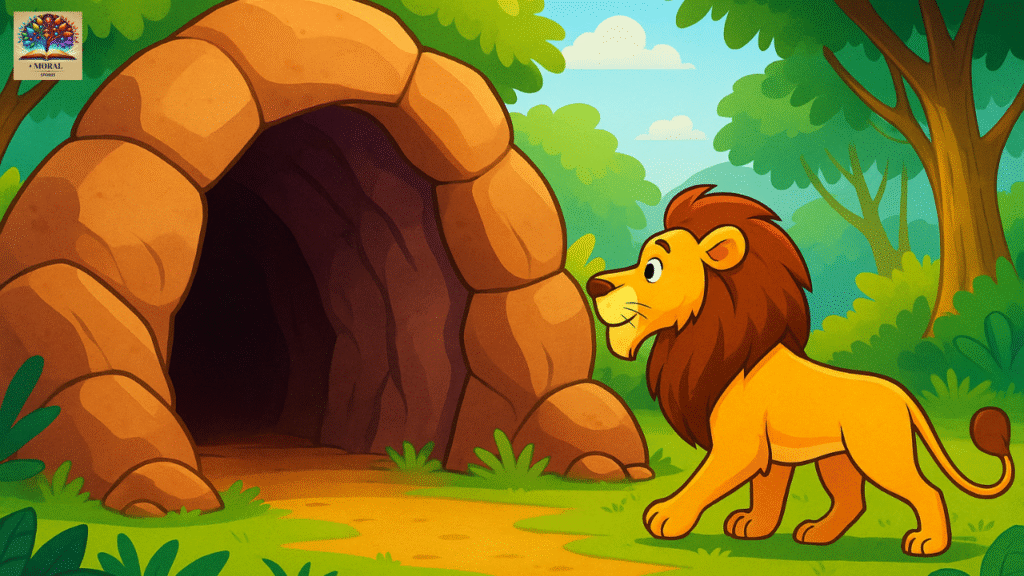
His roar—usually powerful enough to send flocks of birds scattering—faded halfway into a tired grunt. He paused under the shade of a huge banyan tree, closing his eyes for a moment. The wind brushed through his rough mane. The lion knew he needed shelter, even if it was only for a short while. He needed rest—without it, the jungle would claim him.
He moved ahead, dragging his paws slowly. After some time, he reached the mouth of a dark cave carved into the rocky slope of a small hill. It stood quietly, shadowed by creepers and tall shrubs. The lion looked around, sniffing cautiously to sense if any other animal occupied it.
The cave was silent. No scent of fresh presence met his nose.
“Perhaps it is empty,” he thought, though a small doubt lingered.
Too tired to reason, he stepped inside. The cave was cool, and the darkness gave him comfort from the glaring sun. He lay down heavily, stretching his weary body along the stone floor. The silence wrapped around him like a blanket, and soon his eyes began to close.
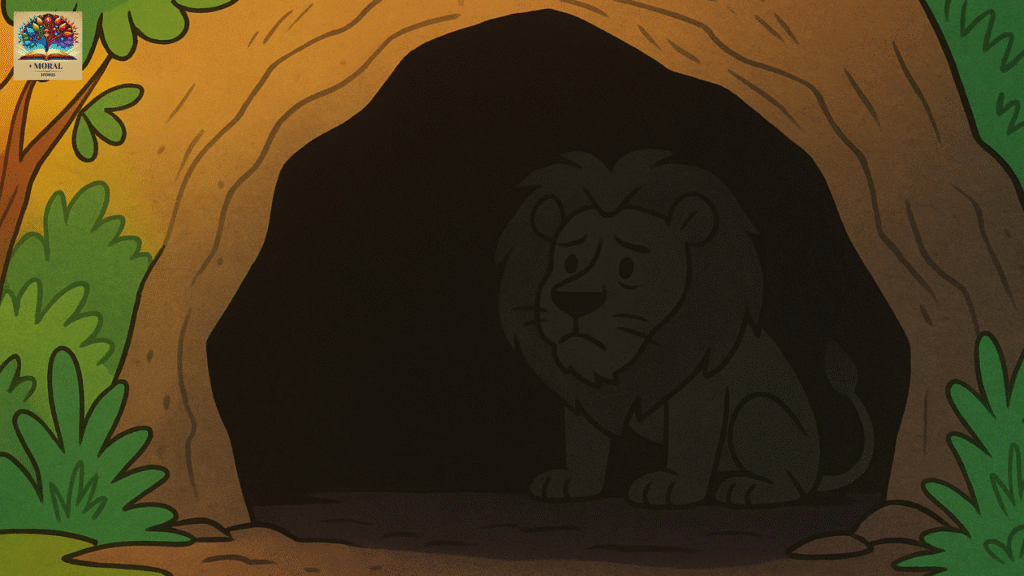
Outside, the forest continued its rhythm, unaware that its king now slept in a cave that was not his own.
The lion did not know that his arrival had been witnessed. He did not know that someone would question what others never dared to. He did not know that courage is not always the roar of a lion—sometimes, it is the cautious whisper of a jackal.
And thus began the saga of The Talking Cave Story in English, where danger lay hidden not in what was seen, but in what was spoken.
🦊 Scene 2 – The Jackal’s Return and a Growing Suspicion
(The Talking Cave Story in English)
Not far from the hill, a clever jackal lived near the edge of the forest. He knew every winding path, every hidden burrow, and every secret that the trees had whispered over the years. This cautious creature survived not by strength but by instinct and observation. He understood the rules of the jungle better than anyone: food feeds the body, but awareness protects life.
One morning, the jackal returned from his nighttime wanderings, humming a tune to himself. He had enjoyed a decent meal the previous night and now headed toward his usual resting place—an old, familiar cave tucked against the hillside. To him, the cave was more than a shelter; it was home.
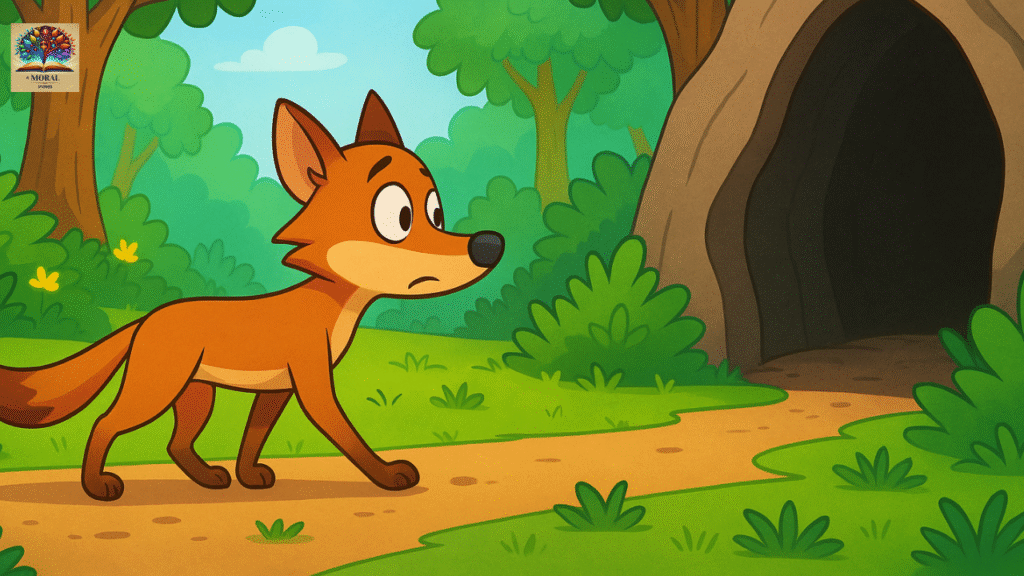
As he approached, he sensed something different. The leaves near the entrance lay scattered, as though disturbed. The soil showed fresh paw marks—large ones. The faint scent of a powerful beast drifted toward him. He froze, the fur on his back rising instinctively.
His heart pounded.
“That is the smell of a lion,” he thought.
Not just any lion—this was the king of the jungle, hungry and unpredictable.
The jackal stopped at a safe distance, observing quietly. He noticed that the entrance appeared darker than usual, as if someone large had blocked out the natural light inside.
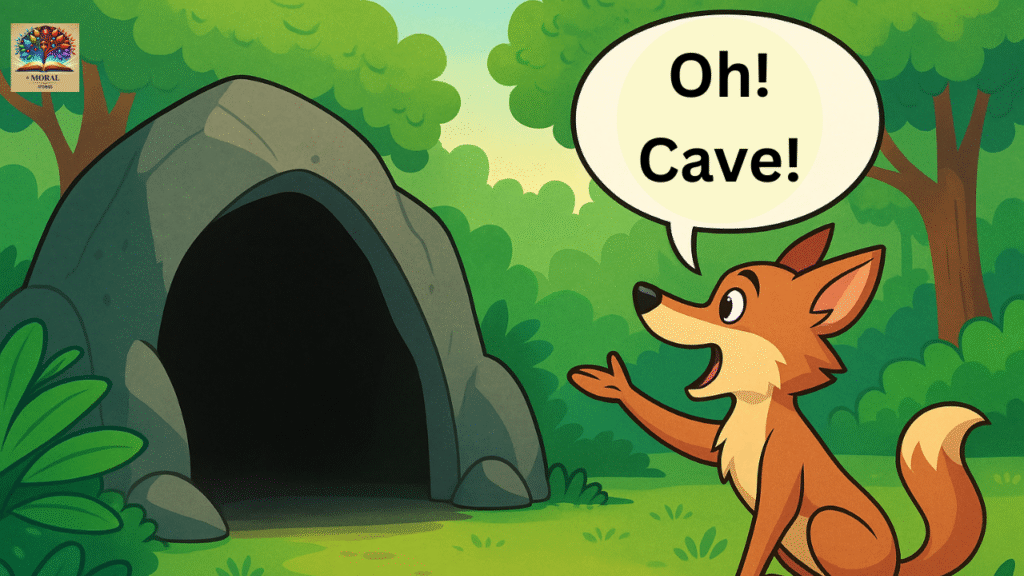
“No normal creature would dare occupy my resting place,” he murmured to himself.
“But if the lion has taken over… then walking inside would be the last mistake of my life.”
The jackal remembered stories and warnings passed down through generations. Though The Talking Cave Story in English might sound magical, it carried a very real truth: danger is not always loud—it can hide in silence.
He paced slowly, thinking deeply. His cautious nature did not allow him to act without reason.
“If I enter blindly, I may never come out again. But if I can be certain that someone dangerous lurks inside… I must find a way to test the cave before stepping in.”
His sharp eyes glistened with intelligence.
“Let the cave speak,” he smiled.
“And let silence reveal the truth.”
What he did next became the turning point of The Talking Cave Story in English, a lesson retold in every version, including The Lion and the Jackal Story in English—where the challenger is not strength but wisdom.
🗣️ Scene 3 – The Cave Speaks (The Talking Cave Moral Story)
(The Talking Cave Story in English)
The jackal stood outside the entrance and called out loudly, “Good morning, Cave! How are you today?”
His voice echoed through the rocks.
Inside, the lion’s ears perked up. He had never heard anyone talk to a cave before. Confused and curious, he kept silent.
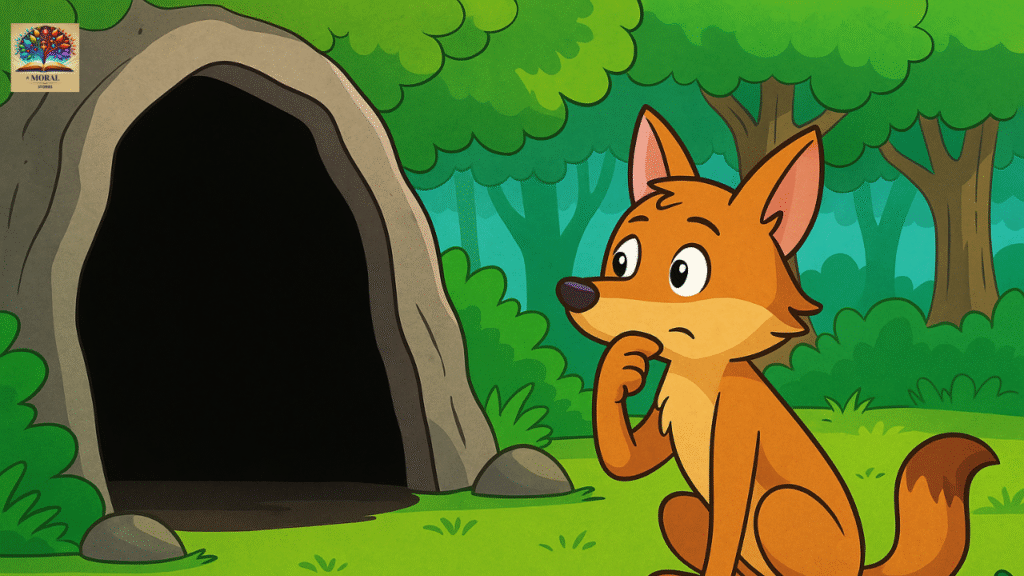
The jackal waited.
There was no response.
He called again, louder this time, “Cave, dear friend! Don’t you greet me today? Have you forgotten your manners?”
Still, silence.
The jackal smiled bitterly.
“This confirms my suspicion…” he thought.
“Whenever I returned home before, this cave greeted me. Today, it remains silent. Something is wrong.”
But the lion inside grew uneasy.
His large body tensed.
He wondered,
“Does this cave actually speak? Have I interrupted something sacred?”
He listened closely.
The jackal continued calmly, “Cave! If you don’t respond to my greeting, I shall assume a dangerous beast is inside.”
The lion began to panic.
He worried that if he remained silent, the jackal might flee.
Hungry and desperate, he did not want to lose a potential meal.
So, in the most unnatural attempt at conversation, the lion spoke from inside the cave, trying to mimic a warm voice.
“Oh… welcome back, dear jackal,” he said awkwardly.
“Please… do come in.”
Though his voice tried to sound friendly, a harsh growl lingered beneath it.
The jackal grinned.
He recognized the trap at once.
That voice was not the cave’s—it was the lion’s.
Now his suspicion had turned into confirmation.
In that moment, The Talking Cave Moral Story unfolded its lesson:
wisdom keeps you alive where power fails.
“Thank you, cave,” the jackal replied with forced excitement.
Then, softly, he added,
“Let me enter… but only after I sing the welcome song we always sing!”
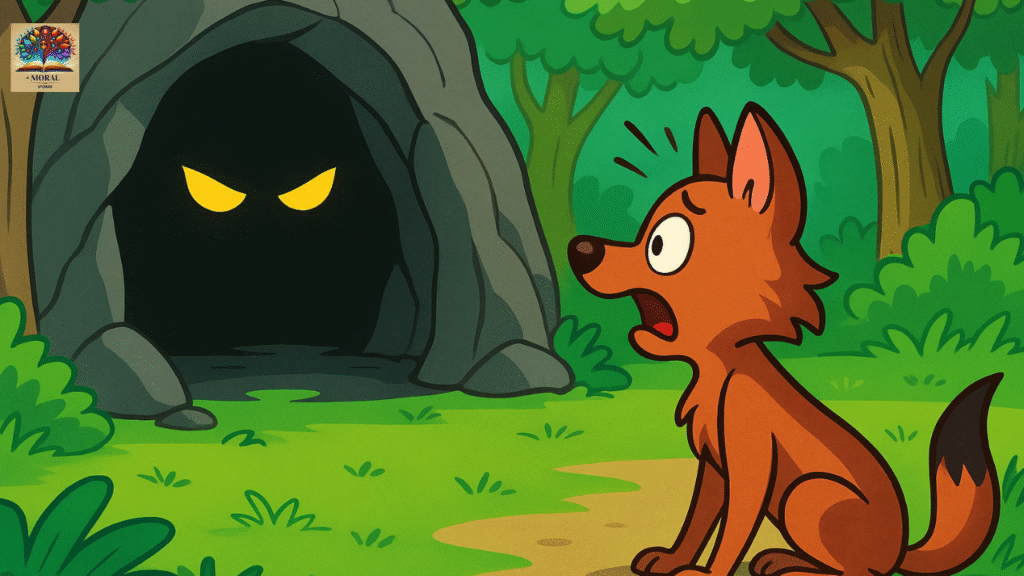
The lion gulped.
He had no idea what “welcome song” the jackal spoke of.
Still, he remained silent, hoping he would not need to respond again.
Perhaps the jackal would walk into his jaws without further testing.
But the jackal’s clever mind had already decided his next step.
He would leave before danger swallowed him whole.
With a cheerful tone, he called out,
“Oh cave, today your voice sounds strange…
I shall return later!”
He turned and began to walk away.
Inside, the lion felt panic rising.
He ran out blindly, desperate not to lose his prey.
But the jackal was already far ahead.
He watched from a safe distance as the lion burst from the cave, exposing his deception.
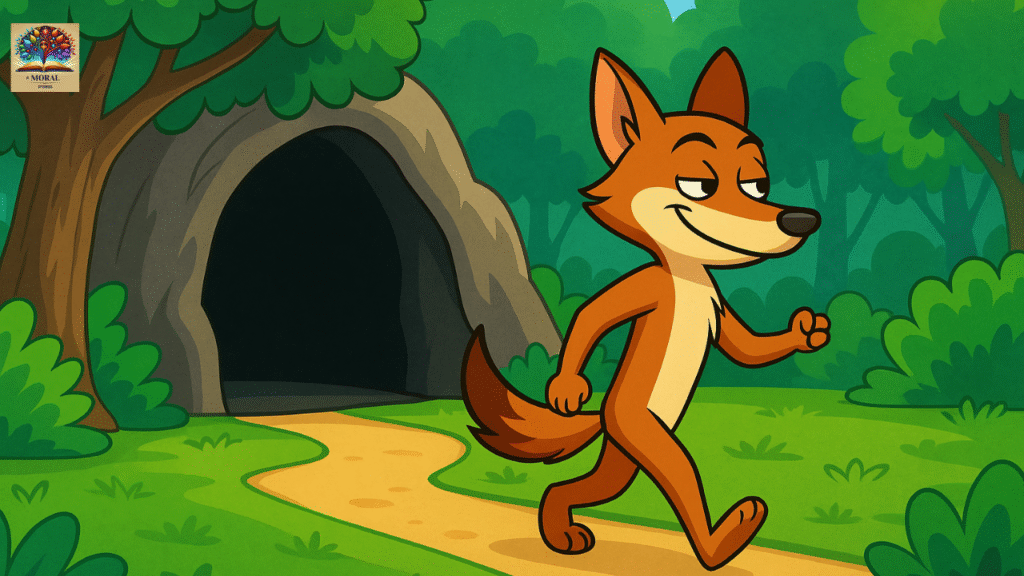
The jackal laughed lightly.
“Dear lion, you may rule with strength…
but wisdom rules over life.”
The lion roared furiously—at his hunger, at his mistake, and at the jackal’s cleverness.
This single moment became the heart of The Lion and the Jackal Story in English, preserved for centuries as a reminder that wit can save even the weakest from the jaws of danger.
Thus continued The Talking Cave Story in English, where cleverness earned victory, and blind power failed yet again.
🦁 Scene 4 – The Lion’s Frustration and the Jackal’s Escape
(The Talking Cave Story in English)
The lion stumbled out of the cave, expecting to pounce on the jackal. But to his dismay, the clever creature was nowhere near. Instead, the jackal stood at a safe distance, watching with alert, gleaming eyes. The lion let out a roar that shook the leaves on nearby trees, but to the jackal, it sounded no different from helpless anger.
“You tricked me!” the lion thundered, pacing in agitation. His hunger and embarrassment sharpened his tone. “No one dares fool the king of the jungle!”
The jackal, however, remained calm. He understood something the lion never had: power without thought becomes weakness. Bowing slightly—not out of respect, but out of wit—he replied, “Maharaj, the jungle bows to your strength. But strength alone is not enough when danger hides behind silence. I simply listened more carefully than others.”
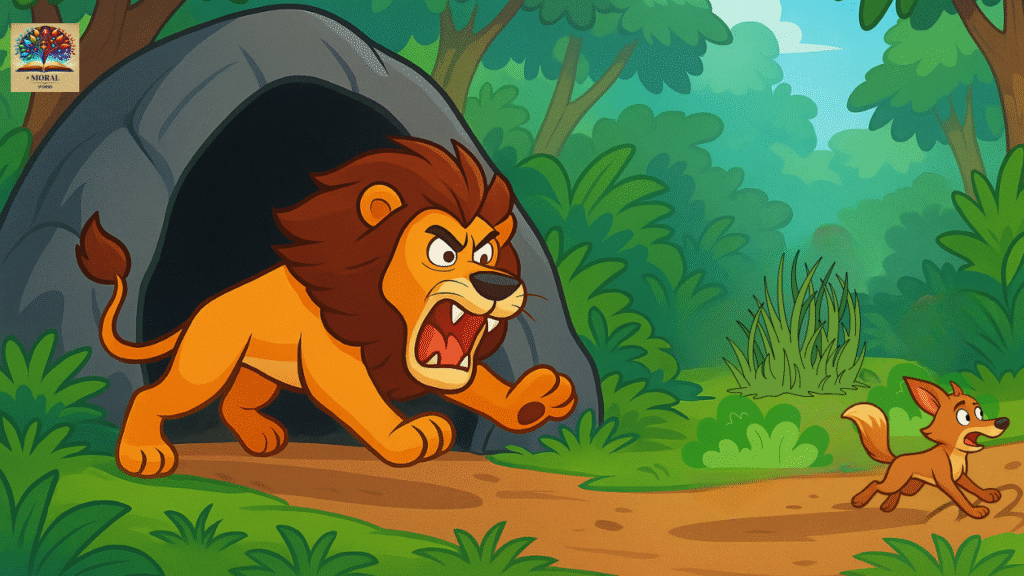
His words stung like thorns. The lion growled, each sound drawn from a belly aching with hunger and wounded pride. He was furious at his own mistake, but fury could not rewrite truth. He had hidden in someone else’s home and betrayed his own nature by trying to imitate a cave.
The jackal added thoughtfully, “In this forest, every creature fights to live. You seek power in muscle; I seek it in understanding. Had I entered without question, your hunger would have ended—and so would my life.”
The lion’s jaws clenched, and he walked slowly toward the jackal, but fatigue weighed him down. Days of hunger had washed away his once-mighty aura, reducing him to a shadow of the beast he had been. His paws trembled slightly as he tried to stand tall.
The jackal read the lion’s body like a poem. “Run, if you wish,” he thought, “but you can barely take more steps.” Still, he remained alert. In the jungle, caution saved more lives than courage.
Seeing the lion struggle convinced the jackal further of something valuable: any creature, no matter how powerful, becomes vulnerable when blinded by pride. In that moment, a living scene from The Lion and the Jackal Story in English unfolded before his eyes—a story told countless times within the Panchatantra Story in English, reminding the world that intelligence must be a companion to survival.
The lion took a few steps forward, but then stopped. His rage had nowhere to go. He could not chase the jackal, nor could he deny his defeat. For a long moment, he stood silent. His breathing slowed as exhaustion stole the strength he once gloried in.
The jackal waited quietly. He did not run; he simply stayed out of reach. After all, true wisdom does not rush—even when danger is near.
Finally, with a frustrated grunt, the lion turned away.
The jungle king had lost—not in battle, but in wit.
He walked slowly into the deeper forest, still hungry, still bewildered. His pride felt heavier than his steps. Though his body longed for food, his mind churned with another feeling: humiliation. In a world where lions ruled by fear, the clever jackal had revealed a painful truth—
even kings can be fooled when their hunger clouds their senses.
The jackal watched him disappear among the trees. Then he turned back toward the cave, sighing with relief. He had trusted his instincts, and they had saved his life.
It was then that the essence of The Talking Cave Moral Story (The Talking Cave Story in English) came alive:
wisdom is not in knowing everything—
wisdom is in knowing when to doubt.
The forest carried on, unaware that a story had just been written—one that would travel beyond time, beyond borders, and become a treasured tale of intelligence triumphing over danger.
The jackal once again approached the cave—not to return inside, but to acknowledge the lesson etched forever into his heart.
“Trust,” he whispered to himself, “is earned only when truth speaks clearly. When silence answers, caution must lead.”
🌿 Scene 5 – Echoes of Wisdom and the Cave’s Silence
(The Talking Cave Story in English)
Afternoon light filtered through the forest canopy, painting gold across the stones and leaves. The cave stood still, quiet as it always had been. The jackal walked a slow circle around it, observing every shadow.
He did not enter—not anymore. He simply stood and watched, thinking.
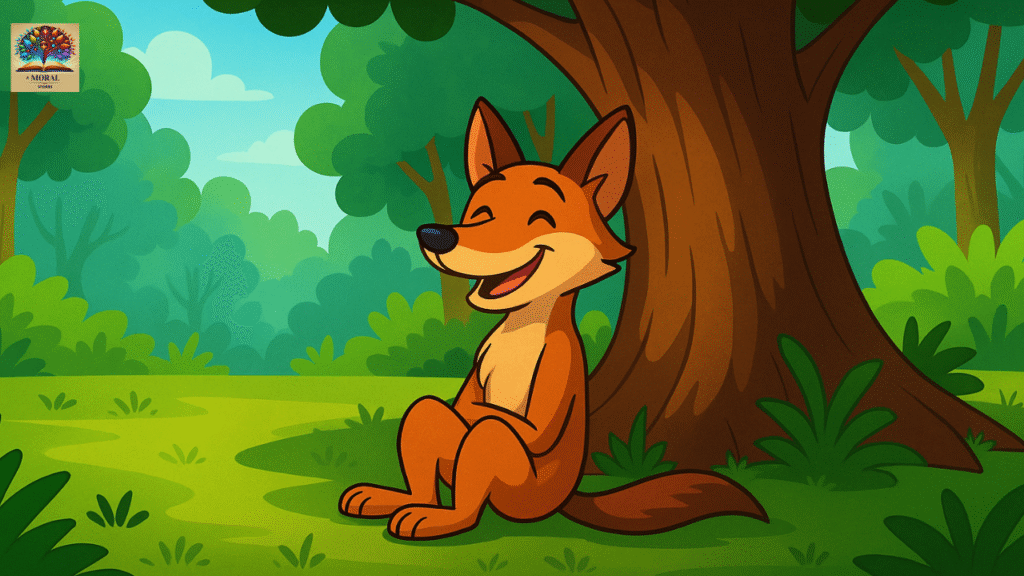
“This cave is innocent,” he thought.
“It never promised safety; I only assumed it.”
He realized that danger rarely announces itself with roaring or stomping feet. More often, it lurks quietly, waiting for the careless to step too close. The jackal knew that if he had relied only on habit, he would have fallen prey to the lion’s hunger.
He spoke softly, as though teaching the trees and soil,
“A wise creature questions even the familiar. When a friend behaves strangely, when silence replaces a familiar greeting—pay attention.”
His words echoed the ancient lesson of the Panchatantra Story in English, a treasure passed from teacher to student, parent to child.
The jackal remembered his elders telling him stories at twilight—stories where the smallest animal became the smartest simply because it chose to think before acting. Stories like The Talking Cave Story in English, where caution saved life, and observation exposed the hidden.
The cave, once his resting place, now stood as a reminder.
From that day onward, he vowed that he would not trust blindly—not even a familiar shelter—unless he could be certain of its safety.
He lifted his head and looked upward, where streaks of sunlight pierced the green blanket of leaves.
“Thought is the first shield,” he murmured.
“Awareness is the second. Together, they protect life.”
With that, he walked away.
The cave remained silent—not because it had changed, but because the jackal had.
And in that transformation lived the true message of The Talking Cave Moral Story:
wisdom does not merely help us survive once.
It shapes how we live every day thereafter.
🌳 Scene 6 – The Forest Remembers
(The Talking Cave Story in English)
As days passed, life in the forest returned to its familiar rhythm. The breeze carried the chatter of monkeys, birds glided through sunbeams, and deer wandered cautiously between watering holes. Yet beneath this natural harmony lay a silent memory — the day a jackal had outwitted a starving king. Though the jungle rarely paused for long, it remembered everything.
Rumors floated among the animals. Some believed the lion had lost his senses; others said the cave itself had tricked him. The truth, however, rested quietly in the heart of the clever jackal. He knew what had saved him — not strength, not speed, but awareness.
While the lion wandered elsewhere, still weakened by hunger, the jackal avoided the cave for many sunrises. He chose new paths, slept under trees, and remained alert whenever he returned near the hillside. The cave, once his place of rest, had become a reminder that safety is never permanent. Wherever danger hides, one must question rather than assume.
Yet the jungle continued to whisper stories. From parrot to owl, from squirrel to deer, the tale spread:
“A jackal once spoke to a cave — and the cave answered.”
Some animals laughed, doubting its truth. Others nodded solemnly, recognizing that the forest often disguises truth beneath mystery. Parents narrated the encounter to their little ones — not merely as entertainment but as a lesson.
The younger creatures began repeating the story in their own playful versions. Though they did not yet grasp the full weight of the message, they learned to pause before rushing inside unknown places. Caution became a new companion to curiosity.
In this subtle transformation lay the quiet triumph of the jackal’s wisdom. Though he had saved only himself, his actions taught countless others in the forest. Strength could inspire fear, but awareness inspired survival.
Even the lion, far away near the swampy woods, remained haunted by his defeat. His hunger gnawed at him, yet his humiliation burned deeper. He could not understand how a small creature had seen through his deception so easily. Every time he closed his eyes, he heard the jackal’s calm voice:
“Strength alone is not enough… one must think.”
The lion’s pride — once his greatest glory — now felt like a heavy weight. He no longer roared loudly; instead, his voice grew quieter, thoughtful. For the first time in his life, he doubted himself.
Was he truly king…
or had the jungle simply allowed him to believe so?
In this quiet struggle, the forest witnessed something rare — the stirring of humility within a creature defined by dominance.
Thus, The Lion and the Jackal Story in English unfolded not just as a tale of cunning, but of change.
“And yet,” the monkey replied thoughtfully, “the jackal knew. How?”
🌿 Scene 7 – Lessons Under the Trees (The Talking Cave Story in English)
(Panchatantra Story in English)
One evening, as the sun lowered behind the sal trees, painting the sky pink and orange, a tortoise and an aged monkey rested beside a small pond. They had lived long enough to see generations grow and perish.
The tortoise stretched his neck slowly. “Did you hear the tale of the jackal and the cave?” he asked.
The monkey nodded. “Yes. Some say the cave spoke. Others say the lion lost his senses.”
The tortoise laughed. “The cave did not speak. The lion did — pretending to be something he was not.”
The tortoise blinked — his eyes slow but wise. “Because he observed. He trusted his instinct, not his habit. Every day he asked the cave to greet him… and every day it remained silent — until the lion arrived.”
“So silence was the warning?” the monkey asked.
“Exactly,” the tortoise said. “A familiar place behaving strangely is not a coincidence. It is a message.”
The monkey scratched his chin. “Then truly this is a gift from the Panchatantra — a lesson disguised as a story.”
“That is why elders tell it to their young,” the tortoise continued. “The forest is not dangerous — ignorance is.”
Their conversation floated like a soft breeze across the pond. Fireflies soon appeared, glowing gently above the water.
Nearby, a young deer overheard them. He had been listening quietly since the discussion began. With wide eyes, he asked, “So… it is not wrong to question?”
The tortoise chuckled. “No, child. Questioning is often the shield that keeps you alive.”
“And what of the lion?” the deer whispered.
“He learned too,” the monkey said. “Hunger teaches desperation. Failure teaches thought.”
The little deer looked toward the trees, imagining the mighty lion humbled by a creature half his size. Through his innocent eyes, the lesson took root.
That night, deep within the quiet forest, many animals repeated similar conversations. The story had traveled far — changing minds, opening eyes, shaping caution.
This is why The Talking Cave Story in English still matters today. It is no longer a simple tale about danger — it is a foundation of wisdom.
🏞️ Scene 8 – Remembering the Cave
(The Talking Cave Moral Story)
Months passed, and the cave remained empty. No animal dared to make it a home, for its silence carried the memory of an unseen danger. It became a symbol — a reminder that danger can hide even where safety once lived.
One early morning, the jackal returned quietly. He stood at the same safe distance he once had, observing. Leaves rustled softly around the entrance, and sunlight warmed the stones.
The jackal’s heart was calm. Time had passed, but the memory of that day remained vivid. He bowed his head slightly — not to honor the cave, but to acknowledge the lesson it had taught him.
He spoke aloud, though no one listened, “You never betrayed me. I betrayed myself when I stopped paying attention.”
The cave remained silent — as it always had been.
And that silence, now understood, felt comforting rather than threatening.
Without stepping inside, the jackal turned and walked away. He had no desire to reclaim the cave. Once a place becomes a reminder of danger, returning to it is not courage — it is carelessness.
Instead, he found comfort under the open sky, trusting not a place but his own awareness. He had learned that the greatest shelter lives not in stone walls but in the wisdom one carries.
Thus, the cave stood as a guardian — not of life, but of memory.
In its quiet darkness lived the essence of The Talking Cave Moral Story:
Safety does not come from strong walls but from strong understanding.
🌍 The Moral Meaning — Wisdom Over Blind Trust
(The Talking Cave Story in English)
At its heart, The Talking Cave Story in English teaches us that life is not only about bravery or power — it is about awareness. The lion believed his strength alone made him unstoppable. But strength without thought becomes a trap one builds for oneself. The jackal, small and physically weaker, had something far more valuable — observation. When a familiar place behaved strangely, he paused, questioned, and tested before stepping inside. That small moment of caution saved his life.
This timeless Panchatantra Story in English reveals a universal truth: danger rarely announces itself. It often hides in silence and familiarity. When we assume safety only because a situation is “normal,” we risk falling into the jaws of carelessness. By thinking before acting, the jackal demonstrates that intelligence is not trickery — it is survival.
The jackal did not fight.
He did not run blindly.
He simply paid attention.
Through him, this tale shows us that the greatest protector is not muscle, armor, or weapons — it is a mindful mind. Even in our modern world, where challenges appear in new forms, the lesson remains the same: listen, observe, and question. If something feels unusual, do not be ashamed to investigate.
The lion’s failure began not in the cave, but in his assumption. He believed deception would give him an easy victory, without realizing that true power belongs to those who think ahead. His hunger clouded his judgment, and his pride prevented him from seeing the jackal’s strategy. His defeat was inevitable because he underestimated the strength of awareness.
This is why The Talking Cave Moral Story remains relevant through centuries. It speaks to every generation: children learning caution, adults navigating complexities, and elders guiding others toward awareness. The story is not only about escaping physical danger — it is about learning to recognize emotional, social, and personal risks.
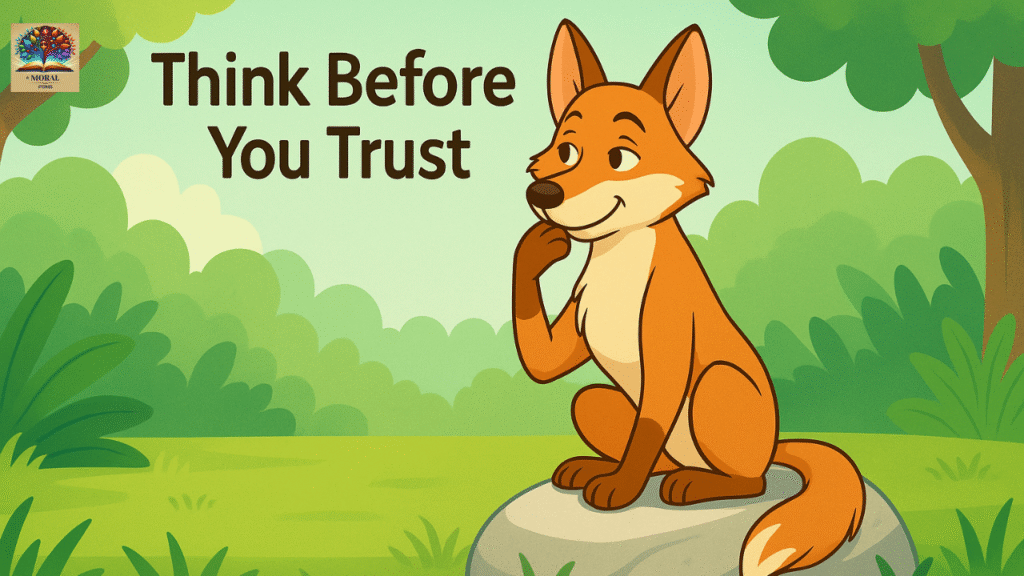
It teaches us:
- Familiarity does not guarantee safety.
- Intelligence is not measured by size or strength.
- Never act blindly — always think first.
Even today, people face situations where they must choose: trust blindly or pause and evaluate. Those who choose wisely avoid unnecessary suffering — just like the jackal. The cave never betrayed him; his assumption almost did.
The story echoes another truth — silence often speaks. The absence of response from the cave was his first clue. Instead of ignoring it, he paid attention. Most mistakes in life are not the result of lack of strength, but of ignoring small signs.
Whether in a jungle, a workplace, a friendship, or any journey, this ancient tale whispers the same message:
“Caution does not come from fear; it comes from understanding.”
The lion’s roar could not overpower the jackal’s wisdom. Strength fades with hunger, tiredness, or time. But awareness remains powerful as long as we nurture it. The Panchatantra, through this story, encourages us to sharpen our minds — to think, evaluate, and act wisely.
That is why The Talking Cave Story in English still matters.
It teaches that the true king is not the strongest, but the wisest.
📜 15 Life Lessons from The Talking Cave Story in English
1️⃣ Awareness protects life — The jackal survived because he noticed something was unusual.
2️⃣ Never trust blindly — Even familiar places can become dangerous.
3️⃣ Strength is not everything — The lion was strong, yet lost to intelligence.
4️⃣ Wisdom grows through observation — The jackal listened before acting.
5️⃣ Silence can be a warning — When the cave didn’t respond, the jackal suspected danger.
6️⃣ Question what feels unusual — Acting without thought leads to trouble.
7️⃣ Fear clouds judgment — The lion’s hunger and desperation made him careless.
8️⃣ Pride invites defeat — The lion believed he could deceive anyone.
9️⃣ Think before you act — Careful thought saved the jackal’s life.
🔟 Cleverness is a powerful shield — Intelligence protects even the weak.
1️⃣1️⃣ Habit should not replace awareness — Just because the cave was safe before didn’t guarantee safety now.
1️⃣2️⃣ Pay attention to small signs — One tiny clue can save you from disaster.
1️⃣3️⃣ Familiarity can be misleading — The jackal almost entered out of comfort.
1️⃣4️⃣ Truth reveals itself through patience — Waiting and testing showed the danger.
1️⃣5️⃣ Real safety lies in wisdom — Not in shelter, but in understanding.
📘 Vocabulary for Readers
(The Talking Cave Story in English)
| Word | Meaning |
|---|---|
| Cave | A hollow place inside the earth or mountain |
| Jackal | A small wild animal similar to a fox |
| Lion | A large wild animal, king of the jungle |
| Panchatantra | Ancient Indian collection of moral stories |
| Jungle | Forest with animals and trees |
| Suspicion | A feeling that something may be wrong |
| Caution | Careful behavior to avoid danger |
| Instinct | Natural feeling or reaction |
| Strategy | A clever plan |
| Trust | Belief that someone or something is safe |
| Silence | No sound; quiet |
| Awareness | Understanding of what is happening |
| Deception | The act of tricking someone |
| Wisdom | Knowledge and good judgment |
| Survival | Staying alive |
🏡 Activities for Parents & Teachers
(The Talking Cave Story in English)
These fun and thoughtful activities help children understand the message of the story while building critical thinking skills.
🎭 1) Role Play
Have students act as the lion, the jackal, and the cave.
They can recreate the situation and discuss how the jackal made his decision.
🎨 2) Draw the Cave
Ask kids to draw the cave entrance, the lion inside, and the jackal talking from outside.
It helps them visualize the moment of suspicion.
🧠 3) Observation Challenge
Place objects in a room and let children identify what’s different when items are rearranged.
Just like the jackal noticed something unusual.
🔊 4) Voice of the Cave
Create an activity where students must respond only when they hear their name, teaching them to listen carefully—not trust blindly.
💬 5) Group Discussion
Ask:
“Why did the jackal wait outside instead of walking in?”
Encourage children to reason and analyze.
✍️ 6) Story Extension Writing
Invite kids to write:
“If you were the jackal, what would you do next?”
This builds creativity and understanding.
❓ FAQs About The Talking Cave Story in English
✅ Q1. What is the main message of The Talking Cave Story in English?
The story teaches us to stay aware and think before acting. Blind trust can lead to danger.
✅ Q2. Who are the main characters in this Panchatantra Story in English?
The main characters are a lion and a jackal.
✅ Q3. Why didn’t the jackal enter the cave?
He found the cave unusually silent and suspected danger, so he tested by calling to it.
✅ Q4. Why did the lion speak like the cave?
The lion wanted to trick the jackal into coming inside so he could eat him.
✅ Q5. What is the lesson of this Talking Cave Moral Story?
Wisdom and careful thinking are stronger than physical power.
✨ Final Thoughts — The Everlasting Wisdom of The Talking Cave
The forest may change, but its lessons remain eternal.
The Talking Cave Story in English is more than a tale of a lion and a jackal — it is a reminder that awareness can save us when strength fails. Throughout life, we face situations that seem familiar or harmless simply because we’ve seen them before. Yet, like the jackal, we must learn to question what feels unusual and use our intelligence to see the truth.
The lion believed his might could overpower caution — but wisdom defeated pride.
This Panchatantra story in English remains relevant in modern times because it echoes the need to stay alert, observe carefully, and never trust blindly. When silence replaces the familiar, let your mind awaken—not your fear.
True strength lies not in muscles but in mindful decisions.
And that is why this timeless Talking Cave moral story continues to guide hearts and minds, generation after generation.
👉 Read More Stories
- The Slum Boy Who Sang the National Anthem Alone – A Republic Day Story 🇮🇳

- The Zomato Delivery Boy Who Refused to Leave During the Flood – A True Indian Story That Restored Faith in Humanity 🇮🇳

- The Old Man Who Walked 5 Kilometers to Hoist the Flag – A Republic Day Story That Will Inspire You

- The Girl Who Refused to Sit During the National Anthem – A Republic Day Story That Touched Millions

- The Little Boy Who Saluted the Flag Every Morning – A Republic Day Story That Will Melt Your Heart 🇮🇳

- The Blind Man and the Honest Thief – A Moral Story About Conscience

🎥 YouTube Channel Subscribe CTA
👉 Subscribe to our YouTube channel for more fun moral stories for children!
🔗 YouTube Channel – A Moral Stories (English)
Enjoyed this heart-touching tale? Subscribe to our YouTube Channel “A Moral Stories” to enjoy more moral stories for kids in English, animated and narrated with love! 🌟📺
Also available in:
🔹 Gujarati – A Moral Stories Gujarati
🔹 Hindi – A Moral Stories Hindi
✨ Recommended Reading – Dive into Wisdom
If your child enjoyed this Talking Cave Moral Story, they will love these beautifully illustrated storybooks filled with ancient wisdom, courage, and clever characters:
👉 Top Picks for You:
- 📘 Panchatantra Moral Stories for Kids (Illustrated English Edition)
- 🐘 Indian Folk Tales & Bedtime Stories – Moral Fables Collection
- 🌟 365 Stories from the Vedas : The Upanishads and the Puranas
✨ These storybooks make perfect bedtime reads for children — full of colorful art, moral values, and timeless lessons.
🛒 Buy Now on Amazon and inspire your little one with the world’s most magical stories! 💫
🔖 Affiliate Disclosure
This post contains affiliate links. If you purchase through these links, we may earn a small commission —





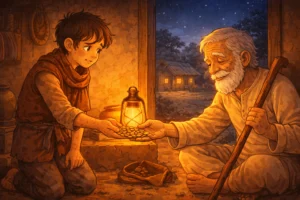
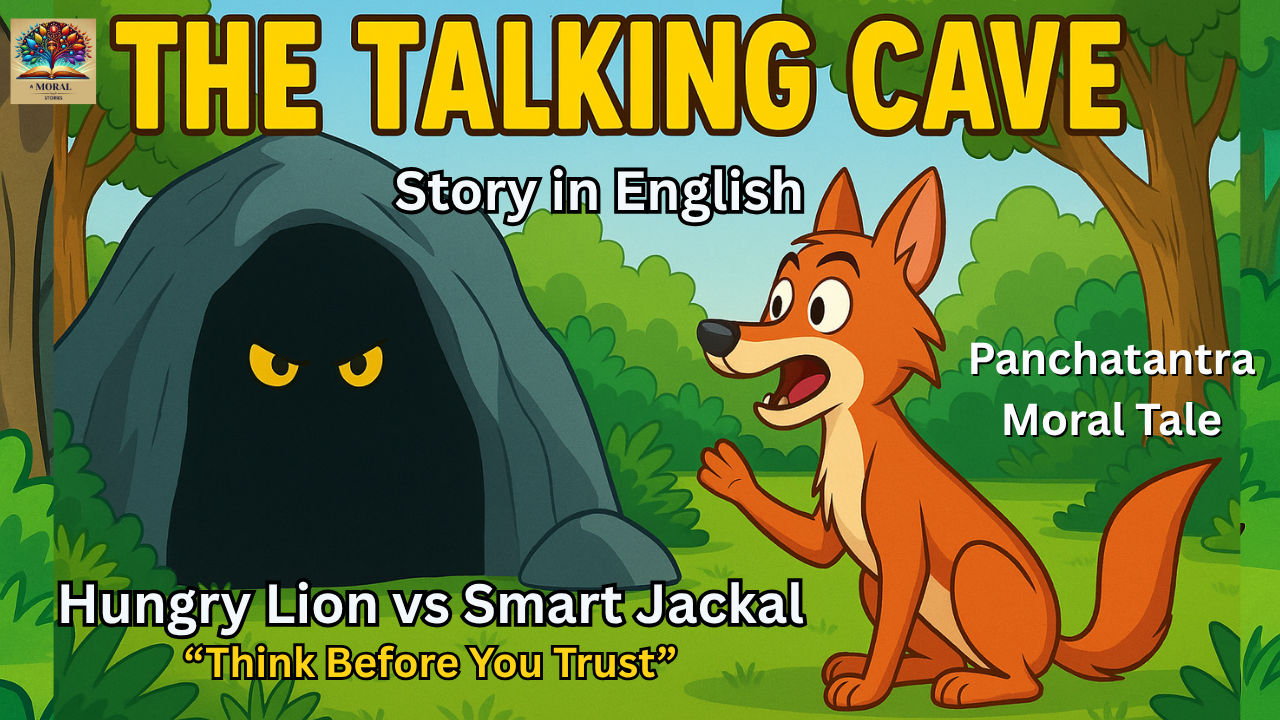
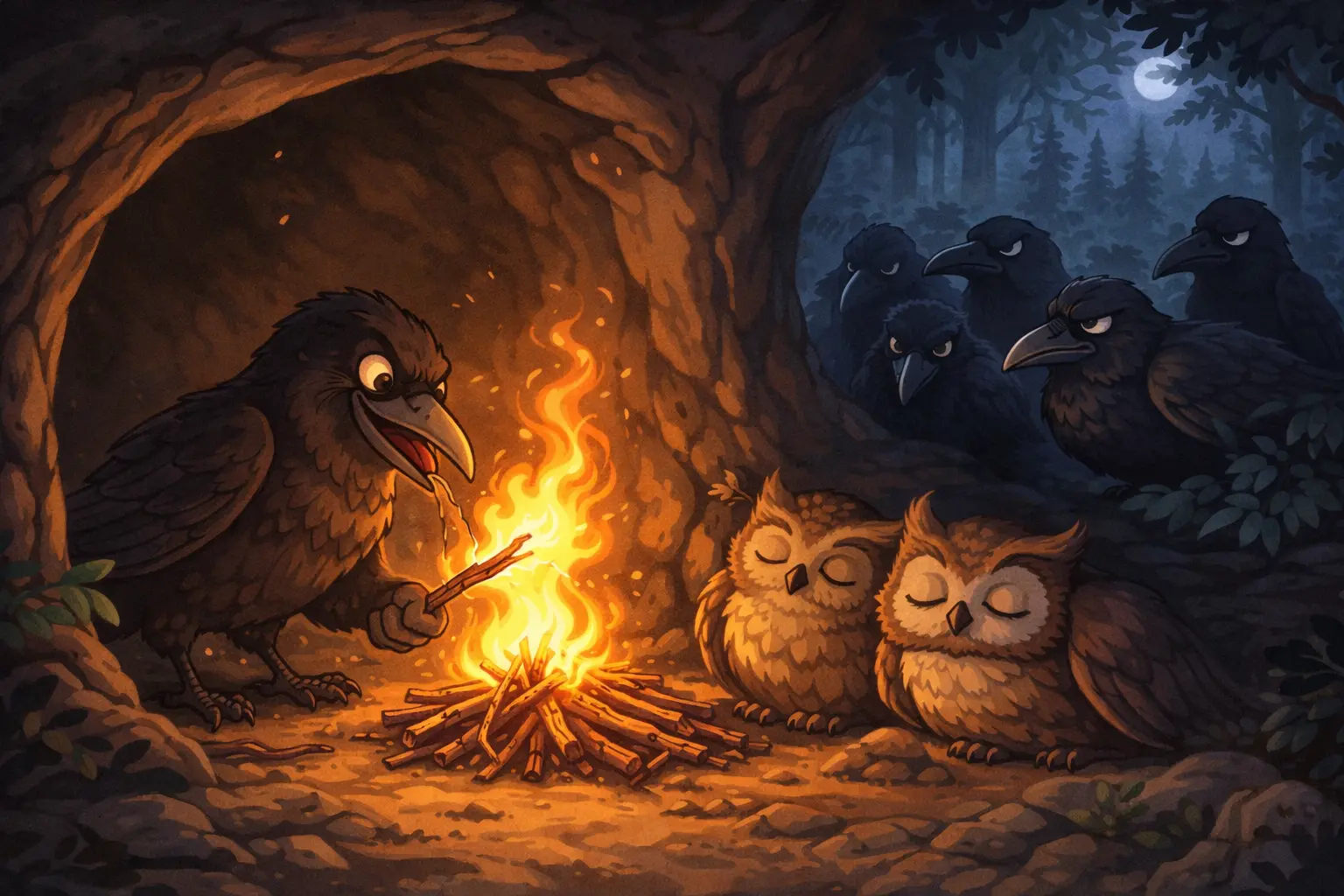


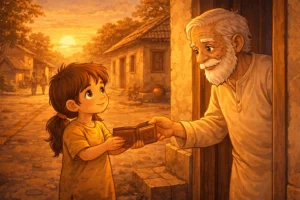


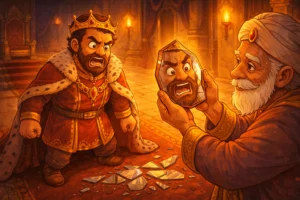

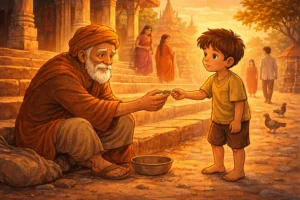

Post Comment